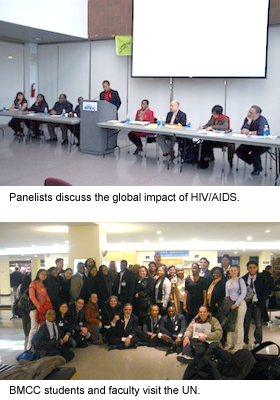
BMCC recently held an “HIV, AIDS, Poverty and Globalization” conference. The event was sponsored by Student World Assembly in collaboration with the Phi Theta Kappa Honor Society, Women’s Resource Center, and the BMCC Nursing Department.
A panel of experts spoke to an audience of BMCC students, staffers and faculty members about the impact AIDS, HIV, and poverty have on each other, and on the world.
The panelists were Irene B.M. Tembo—who gave the keynote address—Counselor of Economics at the Permanent Mission of Zambia to the United Nations; Dr. Mohammad Soleymani, BMCC Professor and Deputy Chair of the Social Science Department; Jacqueline Nichols, Chairperson of BMCC’s Nursing Department; Dicxon Valderruten, Director of Health Education for Osborne Association; Melanie Dulfo of the Women’s Project at Asian and Pacific Islander Coalition (APICHA); and H.R. Clarke, a BMCC Political Science Professor.
“With globalization, the world is shrinking,” said Student World Assembly President, Charlesworth Mabheka.
Pérez Delivers Opening Remarks
BMCC President Antonio Pérez delivered the welcoming remarks. When it comes to knowledge about poverty and HIV around the world, Pérez said, “We make the assumption because we live in a large city that everyone is doing well—that’s just not the case.”
The Global Nature of HIV/AIDS
Nichols, the first panelist, spoke about her time as a community health nurse, when she encountered her first patient with HIV—a 16 year old pregnant teenager.
Irene B.M. Tembo discussed the UN’s role in eradicating poverty and combating HIV/AIDs, which is part of the UN’s Millennium Development.
In September 2008, world leaders came together in New York for an event convened by the UN Secretary-General and the President of the UN General Assembly to renew commitments to achieving Millennium Development Goals, with the main focus on ending poverty.
“Urban poverty is one of the biggest problems facing African Countries,” Tembo said. “HIV/AIDS is the leading cause of death in Sub-Sahara Africa.”
Other Speakers
Mohammad Soleymani used charts and graphs to show the audience how AIDs affected those who are incarcerated.
Melanie Dulfo stressed the importance of AIDs education in the U.S. “I’ll even talk to people in nightclubs about HIV and AIDs awareness,” she said. She added that AIDs is no longer a “gay man’s disease—everyone is at risk and the demographics are changing.”
Professor H.R. Clarke, who along with Soleymani, is an advisor to the BMCC Student World Assembly, reminded the audience that Nelson Mandela’s son died of AIDs. “Not only poor people die of AIDS, but so do royalty,” he said.
Visit to UN
As a tie-in to the conference, approximately 50 BMCC staffers and students toured the United Nations. “Students were really excited that President Pérez saw us off in the lobby before we headed to the UN,” Mabheka said.
On the tour, the students were split into groups and briefed on the workings and operations of the UN. “We were told that initially we were going to be briefed about terrorism. But at the last minute, we were briefed on poverty and the UN’s Millennium goals. It was a blessing in disguise, since we just had our HIV/AIDs event,” Mabheka said. “We learned how the UN plans to eradicate poverty by 2015.”

